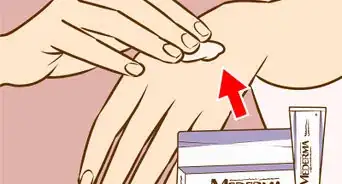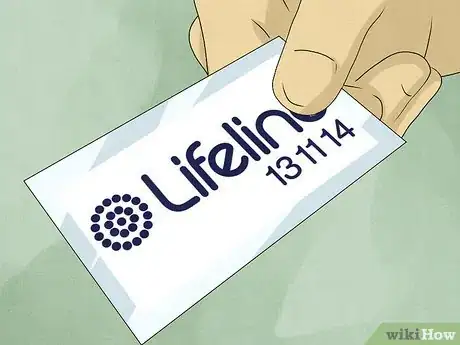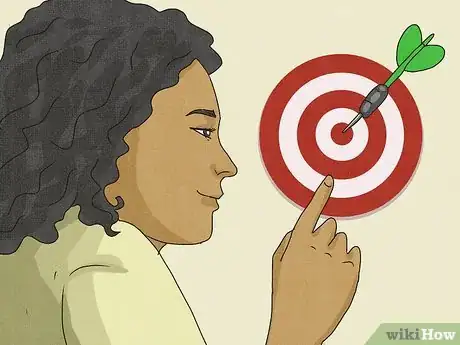This article was co-authored by Liana Georgoulis, PsyD and by wikiHow staff writer, Madeleine Flamiano. Dr. Liana Georgoulis is a Licensed Clinical Psychologist with over 10 years of experience, and is now the Clinical Director at Coast Psychological Services in Los Angeles, California. She received her Doctor of Psychology from Pepperdine University in 2009. Her practice provides cognitive behavioral therapy and other evidence-based therapies for adolescents, adults, and couples.
There are 13 references cited in this article, which can be found at the bottom of the page.
This article has been viewed 24,561 times.
It’s shocking and confusing when you learn that your partner self-harms. A lot of questions might come up—for example, if you’re the only one they trust, you might ask yourself if you’re the only one they can rely on. While it may feel that way, there are actually a lot of resources and tools out there for them. If you’d like to support them in finding healthier habits, we’re here for you. This article will discuss how to get your partner to stop cutting herself and review steps to take to help them heal.
Steps
Discuss what’s been stressful for them.
-
Open up a dialogue about her emotional triggers. They'll have a chance to pause and unpack their thoughts. Ask if they can name a specific feeling that she’s experiencing. Then, check and see if they can identify what influenced their mood. They may have got caught up in the heat of the moment and instantly reacted to something, or they might have a lot of struggles that they have been holding in. Try to get a sense for what they're going through with sensitive questions like:[1] X Research source
- “What’s the best way to describe how you’re feeling right now?”
- “Do you remember when exactly you felt the urge to hurt yourself?”
- “Have you been stressed by anything lately? Was it one event or a combination of factors?”
Respect their wishes if they don't want to talk at the moment.
-
Give them space so they can decompress. Tell them you're perfectly fine with dropping the subject if that's what they really need. Reassure them that you're still there for them even when they need some privacy.[2] X Expert Source

Licensed Psychologist Expert Interview. 6 September 2018. In order to keep the dynamic as relaxed as possible, make calm remarks like:[3] X Research source- "Thank you for bringing up your boundaries. We can talk about something else."
- "That's cool with me if this subject's off-limits. What would you like to do instead?"
- "I respect your need for privacy. I really appreciate you being honest with me."
Listen without any judgment.
-
Allow her to fully express herself so they feel completely accepted. Look them in the eyes, hold their hand, and nod instead of interrupting them–you’ll show you empathize with them situation. Even if what they say is scary or intense, keep a neutral facial expression. Be kind and convey your concern in a non-judgemental way.[4] X Expert Source

Licensed Psychologist Expert Interview. 6 September 2018. They'll feel at ease and appreciate that she can open up to you.[5] X Research source- Once she’s finished, validate their experience with a comment like, “That sounds incredibly challenging.”
- Then, thank them for all their honesty and vulnerability. For example, say, “I feel honored that you can share this with me.”
- Follow up with them and give her more opportunities to talk. Reach out with something like, “Just checking in. How are you right now?”
Ask how you can comfort them.
-
Let them say how they would like to be supported to respect their needs. Say you want to be an understanding partner and take care of them in any way you possibly can. Maybe they just want to vent, or they may prefer lots of affection. Since they are their own unique person, they'll have their own standards for what feels good. Check in with questions like:[6] X Trustworthy Source National Health Service (UK) Public healthcare system of the UK Go to source
- “Would a fun distraction help?”
- “Do you want to just vent?”
- “How would it feel to be held right now?”
- "Could you use some company? I’m free.”
Refer them to a hotline.
-
Give them a list of numbers so they can call them up ASAP. As much as they'd benefit from your help, your partner can get even more support from an organization that’s there for them 24/7. Tell them that there are crisis workers who are specially trained and who can provide intervention when there’s an emergency. Ask for them to call them up as soon as they have the urge to hurt themselves. Also let them know it’s perfectly fine to keep reaching out as much as they need to.[7] X Research source
- If she’s in the US, she can call S.A.F.E Alternatives at 1-800-366-8288.
- If she’s in the UK, she can call Mind Infoline at 0300 123 3393.
- If she’s in Canada, she can call Crisis Text Line at 1-800-668-6868.
- If she’s in Australia, she can call Lifeline at 13 11 14.
- If she’s in India, she can call Helpline at 1860 2662 345 or 1800 2333 330.
Refer them to mental health professionals.
-
Counselors and crisis agencies are specially trained to help them. Crisis agencies are non-profit centers that will provide her guidance at no cost. When they share their concerns, frustrations, and habits with qualified and caring volunteers, they'll have a whole new community to lean on. Encourage them to also book sessions with a therapist who can find the root cause of their pain.[8] X Expert Source

Licensed Psychologist Expert Interview. 6 September 2018. They’ll not only listen to your partner, but they’ll also talk about healthy ways to cope with their emotions.[9] X Research source- Trained staff will be able to assess how much of a risk they are to themselves.
- They’ll also be able to refer them to additional resources, like therapists and support groups.
- They can continue to go to maintain a sense of stability and talk about a treatment plan.
Expert AnswerQHow can you convince someone if they are hesitant to seek help?
Dr. Liana Georgoulis is a Licensed Clinical Psychologist with over 10 years of experience, and is now the Clinical Director at Coast Psychological Services in Los Angeles, California. She received her Doctor of Psychology from Pepperdine University in 2009. Her practice provides cognitive behavioral therapy and other evidence-based therapies for adolescents, adults, and couples.Licensed Psychologist
 EXPERT ADVICEAnswer from Liana Georgoulis, PsyD:
EXPERT ADVICEAnswer from Liana Georgoulis, PsyD:You can tell that person that it is absolutely within normal human behavior to have struggles, painful emotions, worries, fears, and doubts. And we are not adequately taught to navigate the inner workings of our mind and emotions. So, it is okay to seek help.
Help them find alternatives to self-harming.
-
Share some new habits that can provide an outlet for them. First, encourage them to wait 5-10 minutes every time they believe they've hit a limit, journal or think about the mood they're in, and identify why self-harm seems to give them relief. Once they've opened up, offer them healthy alternatives to process their emotions like these:
- If they're angry, they can let off steam by hitting a pillow, ripping paper, or crushing a can.
- If they're sad, they can call up a friend, scream into a pillow, or cry as they play some music.
- If they're on edge, they can snap rubber bands, jog, or try out yoga.
- If they're numb, they can dunk their hand in cold water or clap their hands.
Give them plenty of praise.
-
Self-harm is tied to low self-esteem, so boost their confidence. If you constantly compliment them and pay attention to all their strengths, you’ll give them a lot of uplifting things to think about. You may even cancel out all the “noise” and negative self-talk that goes on in their head.[10] X Research source
- Tell them why they're important to you and how much you’re glad they're in your life.
- Focus on any special talents or skills of theirs.
- Help them come up with “mantras,” or hopeful and kind phrases they can repeat. They can say something like, “I am always worthy of love and respect.”
Brainstorm artistic ways to express themselves.
-
Creativity is an inexpensive form of therapy and can be really rewarding. Chat about whatever speaks to them—they may prefer music, drawing, dancing, writing, or another medium. Ask about why they like that style so much, then encourage them to channel all their feelings into an art piece. They may really enjoy fueling projects with everything they used to keep pent up inside.[11] X Trustworthy Source PubMed Central Journal archive from the U.S. National Institutes of Health Go to source
- Art helps balance their emotional and psychological wellness because it gives them an outlet.
- Once they release anger, sadness, or frustration, their mood is likely to improve.
- The two of you can also bond as they share their projects and explains what inspired them.
Map out some new goals with them.
-
When their mind’s on the future, they'll feel a lot less stuck. Focus on how they can maintain good habits, like attending therapy and getting enough sleep. For example, they can make a pact to see their counselor for six months and stick to eight hours of rest. Be sure to discuss big visions about school or their dream career. Discussing ambitions will be a great way to spark some hope.[12] X Trustworthy Source PubMed Central Journal archive from the U.S. National Institutes of Health Go to source
- A goal set with their therapist might sound like, “I will journal every time I get overwhelmed and talk about what I wrote down in my sessions.”
- An academic ambition can be something like, “I will attend more tutoring sessions so I can get the best grade possible in my Economics class.”
- A vision for their career may sound like, “I really want to make use of all my empathy and become a social worker. I’ll need to model good habits for the families I serve.”
- If your partner has anxiety, talking about the future might make them more anxious, so be careful.
Bring up the importance of exercise.
-
Help get them moving so they can release some tension. The more activity they get, the less likely that they'll isolate themselves inside and turn to self-harm. If you’re far away from your partner and can’t join them, talk about what gets them excited, like dancing or kickboxing, then support them in signing up for some classes or in making a workout schedule. Once they work out, they'll also release “endorphins,” feel-good hormones that will lift their mood.[13] X Trustworthy Source Mind U.K.-based mental health charity focused on providing advice and resources to anyone facing mental health problems. Go to source
- Remind them that any kind of vigorous exercise can help them let go of a lot of anger.
- Encourage them to try group workouts so they can expand their social circle.
- Point out relaxing activities, too, like yoga or Pilates.
Be patient with them.
-
Recognize that progress takes time and discuss what they've learned. Empower them by letting them talk about how they've educated themselves about their habits and emotional health. It’ll be easier for them to stay on track and resist self-harm if they can celebrate all their “wins,” such as how they've used their favorite ways to cope and how they've identified their strongest emotional triggers. After they've shared, thank them for taking such good care of themselves.[14] X Trustworthy Source PubMed Central Journal archive from the U.S. National Institutes of Health Go to source
- Staying on the topic of safety and prevention of self-harm is more likely to motivate them.
- Ask what was the biggest factor in helping them quit self harming: it may have been for themselves, for others, or to prepare for a significant new chapter, like moving to a new school.[15] X Research source
- Once they've shared their motivation, make sure to keep bringing it up to them.
Expert Q&A
-
QuestionHow do you support a friend who is self-harming?
 Liana Georgoulis, PsyDDr. Liana Georgoulis is a Licensed Clinical Psychologist with over 10 years of experience, and is now the Clinical Director at Coast Psychological Services in Los Angeles, California. She received her Doctor of Psychology from Pepperdine University in 2009. Her practice provides cognitive behavioral therapy and other evidence-based therapies for adolescents, adults, and couples.
Liana Georgoulis, PsyDDr. Liana Georgoulis is a Licensed Clinical Psychologist with over 10 years of experience, and is now the Clinical Director at Coast Psychological Services in Los Angeles, California. She received her Doctor of Psychology from Pepperdine University in 2009. Her practice provides cognitive behavioral therapy and other evidence-based therapies for adolescents, adults, and couples.
Licensed Psychologist Communicate concern and love to your friend in a way that is not judgmental. Be kind and convey your feelings for them in a calm, concise, and straightforward manner. Let them know that you are there for them.
Communicate concern and love to your friend in a way that is not judgmental. Be kind and convey your feelings for them in a calm, concise, and straightforward manner. Let them know that you are there for them.
You Might Also Like














References
- ↑ https://www.thetrevorproject.org/resources/article/support-for-self-harm-recovery/
- ↑ Liana Georgoulis, PsyD. Licensed Psychologist. Expert Interview. 6 September 2018.
- ↑ https://psychcentral.com/blog/how-to-respect-other-peoples-boundaries
- ↑ Liana Georgoulis, PsyD. Licensed Psychologist. Expert Interview. 6 September 2018.
- ↑ https://www.psychologytoday.com/us/blog/the-gen-y-psy/202007/how-listen-someone-without-judgment
- ↑ https://www.nhs.uk/mental-health/feelings-symptoms-behaviours/behaviours/self-harm/how-to-help-someone-else/
- ↑ https://psycnet.apa.org/record/2016-28983-001
- ↑ Liana Georgoulis, PsyD. Licensed Psychologist. Expert Interview. 6 September 2018.
- ↑ https://www.mentalhealth.org.uk/publications/truth-about-self-harm
- ↑ https://www.cambridge.org/core/journals/journal-of-psychologists-and-counsellors-in-schools/article/selfharm-behaviour-in-adolescents-body-image-and-selfesteem/2EFA88A3516BB08FEAB783C76FFBD89E
- ↑ https://www.ncbi.nlm.nih.gov/pmc/articles/PMC2804629/
- ↑ https://www.ncbi.nlm.nih.gov/pmc/articles/PMC6615268/
- ↑ https://www.mind.org.uk/information-support/types-of-mental-health-problems/self-harm/helping-yourself-now/
- ↑ https://pubmed.ncbi.nlm.nih.gov/31240823/
- ↑ https://www.psychologytoday.com/us/blog/the-deviance-society/201202/quitting-self-injury
About This Article


























































